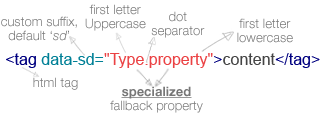A Joomla 3.2+ system plugin that uses the JMicrodata library.
Created during the Google Summer of Code 2014.
If you want to keep your views separated from the logic, plg_system_microdata is a system plugin for parsing the HTML markup and converting the data-* HTML5 attributes into the correctly formatted Microdata syntax.
The data-* attributes are new in HTML5, they give us the ability to embed custom data attributes on all HTML elements. So if you disable the library output, the HTML will still be validated. The default suffix that the library will search for is data-sd, where sd stands for structured data, but you can register more than one custom suffix.
Download the last version of the plugin and install it. Don't forget to publish this plugin!
Since the system plugin runs immediately before the final content is sent to the client, you can use the plugin syntax everywhere, including native and third-party extensions that allow HTML editing.
The type defines which schema is being used for the following markup. The Type must always have the first character Uppercase to be correctly interpreted. If the type is a valid schema, the global scope for the page from this point onwards is updated to this schema. The plugin will replace the data tag with itemscope itemtype='https://schema.org/Type'.
<div data-sd="Article">
<p>This is my article</p>
</div>This will be output:
<div itemscope itemtype="http://schema.org/Article">
<p>This is my article</p>
</div>
Once a schema has been declared, the next step is to declare individual properties – explaining the content and giving it semantic meaning.
The property must always have the first character as lowercase to be correctly interpreted. If the property is found to be part of the current schema, the plugin will replace the data tag with itemprop='property'. If the property is not found to be a valid property of the active schema, it will be ignored and the next available property will be parsed.
<div data-sd="Article">
<p data-sd="articleBody">This is my article</p>
</div>This will be output:
<div itemscope itemtype="http://schema.org/Article">
<p itemprop="articleBody">This is my article</p>
</div>
Sometimes you may want to explicitly state a property which should only be used when a specific schema is active – for example, if the property has a specific property in one schema, which is called something different in another schema.
It is possible to achieve this by using a schema–dependant property. This works by using a combination between both Type and property, separated by a full stop. In short, if the current global scope is equal to Type and the property is part of that Type, the plugin will replace the data tag with itemprop='property'.
<div data-sd="Article">
<p data-sd="articleBody">This is my article</p>
<p data-sd="Article.wordcount">4</p>
</div>This will be output:
<div itemscope itemtype="http://schema.org/Article">
<p itemprop="articleBody">This is my article</p>
<p itemprop="wordcount">4</p>
</div>
It is possible, using a combination of these, to specify multiple properties including some which are specific for a schema and others which are generic. The order of the building blocks isn't significant and a white space is used as a separator.
<div data-sd="Article">
<p data-sd="articleBody">This is my article</p>
<p data-sd="Article.wordcount">4</p>
<p data-sd="Recipe.recipeCategory Article.articleSection description">Amazing dessert recipes</p>
</div>This will be output:
<div itemscope itemtype="http://schema.org/Article">
<p itemprop="articleBody">This is my article</p>
<p itemprop="wordcount">4</p>
<p itemprop="articleSection">Amazing dessert recipes</p>
</div>Sometimes it is necessary to nest schemas – for example if you want to describe a person when you have the Article schema open. This is possible using nested schemas. To use this, simply append the schema preceeded by a full stop, after the property. Once you have finished using the nested schema, close the containing tag, and re-set the original schema.
<div data-sd="Article">
<p data-sd="articleBody">This is my article</p>
<p data-sd="Article.wordcount">4</p>
<div data-sd="author.Person">
<p data-sd="name">John Doe</p>
</div>
<p data-sd="Article keywords">Cake</p>
</div>This will be output:
<div itemscope itemtype="http://schema.org/Article">
<p itemprop="articleBody">This is my article</p>
<p itemprop="wordcount">4</p>
<div itemprop="author" itemscope itemtype="http://schema.org/Person">
<p itemprop="name">John Doe</p>
</div>
<p itemprop="keywords">Cake</p>
</div>- First the parser checks for setTypes. If one or more matches are found then the current global scope will be updated with the first match. At this point if there are no specific or generic properties the algorithm will finish and replace the data tag with the specified scope. Otherwise continue to point 2.
- The parser checks for specific item properties. If one or more valid matches are found, then the algorithm will finish and replace the data tag with the first match property. Otherwise go to point 3
- The parser checks for generic properties. If one or more valid matches are found, then the algorithm will replace the data tag with the first property that is matched, and complete the algorithm.
To apply markup within articles simply use the data tag and the method explained above.
See below for an example.
Let's suppose that somewhere in your code you need to add Microdata semantics to the following HTML which is part of an article (e.g. $scope='Article';).
<div data-sd="<?php echo $scope;?>">
<!-- Title -->
<span data-sd="Review.itemReviewed name">
How to Tie a Reef Knot
</span>
<!-- Author -->
<span>
Written by
<span data-sd="author.Person">
<span data-sd="name">John Doe</span>
</span>
</span>
<!-- Date published -->
<meta data-sd='<?php echo $scope;?> datePublished' content='2014-01-01T00:00:00+00:00'/>1 January 2014
<!-- Content -->
<span data-sd='reviewBody articleBody'>
Lorem ipsum dolor sit amet...
</span>
<div>The output will be:
<div itemscope itemtype='https://schema.org/Article'>
<!-- Title -->
<span itemprop='name'>
How to Tie a Reef Knot
</span>
<!-- Author -->
<span>
Written by
<span itemprop='author' itemscope itemtype='https://schema.org/Person'>
<span itemprop='name'>John Doe</span>
</span>
</span>
<!-- Date published -->
<meta itemprop='datePublished' content='2014-01-01T00:00:00+00:00'/>1 January 2014
<!-- Content -->
<span itemprop='articleBody'>
Lorem ipsum dolor sit amet...
</span>
<div>Instead, if you decide to change the current Type (e.g. $scope="Review";).
The output will be:
<div itemscope itemtype='https://schema.org/Review'>
<!-- Title -->
<span itemprop='itemReviewed'>
How to Tie a Reef Knot
</span>
<!-- Author -->
<span>
Written by
<span itemprop='author' itemscope itemtype='https://schema.org/Person'>
<span itemprop='name'>John Doe</span>
</span>
</span>
<!-- Date published -->
<meta itemprop='datePublished' content='2014-01-01T00:00:00+00:00'/>1 January 2014
<!-- Content -->
<span itemprop='reviewBody'>
Lorem ipsum dolor sit amet...
</span>
<div>plg_system_microdata is licensed under the GNU GPL v2 License – see the LICENSE file for details.




